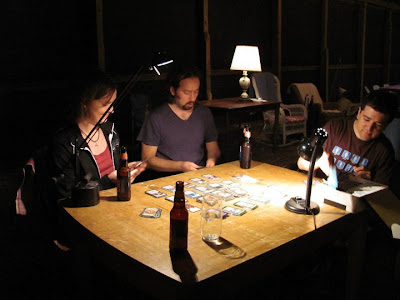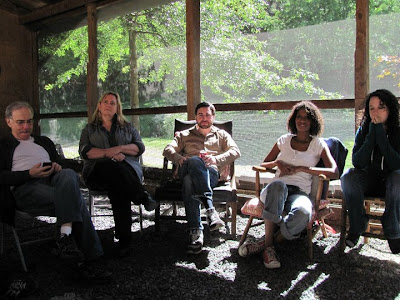Mission Statement
Mission Statement: Flux Theatre Ensemble produces transformative theatre that explores and awakens the capacity for change. As an ensemble-artist driven company, we believe that long-term collaboration and rigorous creative development can unite artists and audiences to build a creative home in New York.
Believe it or not, that mission statement is the result of four years of battling over the meaning of every single word. That journey wasn’t easy in part because of my feeling that a mission statement was somehow antithetical to the creation of art, like pinning butterflies to the wall; and our mutual fear in crafting one of the interchangeably generic mush statements that abound.
But gradually, others in Flux made compelling cases for how a mission could prove useful, and we lurched fitfully towards carving one out. At our annual retreat, we finally hammered it out. What follows is an unpacking of our mission statement, with an eye towards both its conceptual history and practical application.
 (Photo: Heather Cohn. Pictured at some late night retreat gaming, Kelly O’Donnell, August Schulenburg and Isaiah Tanenbaum)
(Photo: Heather Cohn. Pictured at some late night retreat gaming, Kelly O’Donnell, August Schulenburg and Isaiah Tanenbaum)Flux Theatre Ensemble: That’s us.
Produces: We used this word as opposed to creates because some of the work we do comes from outside the development process outlined in the second sentence; and our identity as artist-producers is important to us.
Transformative theatre: What on earth does this mean? We’ve long valued this expression without being able to quite define it. Our recently posted aesthetic values will give you a sense of what it means to us on the stage; we value the capacity for change in every element of production. This means characters who either enact great change in the world of the play or are themselves significantly transformed; themes which compound layers of meaning as the action builds; worlds that live on the edge of some fundamental shift; contrasting aesthetic styles in a single play that, juxtaposed, create some new way of playing; staging that celebrates the transformative power of the audience’s imagination; and above all, a charged ambiguity of meaning that lives in the audience’s body and mind long after the play ends.
That explores and awakens: The plays we do not only stake out new territory in the evolutions of the human spirit, but awaken the capacity for that evolution in our audience.
The capacity for change: The patterns of narrative that give human life meaning must constantly be challenged and expanded by the communal, creative act of art; doing so allows new, more vital narrative patterns to emerge, increasing our mutual capacity for life. That may sound lofty, but it is entirely practical; the plays we do must wrestle with some new way of seeing; they must create the possibility of some new pattern of meaning. It’s important to note that doesn’t mean a traditionally avant-garde style; we do not seek to take simple things and make them seem complex; rather we hope to take complex things and tell them as simply and directly as possible.
 (Photo: Heather Cohn. Pictured at the retreat’s closing circle – Ken Glickfeld, Jane Lincoln Taylor, Cat Adler-Josem)
(Photo: Heather Cohn. Pictured at the retreat’s closing circle – Ken Glickfeld, Jane Lincoln Taylor, Cat Adler-Josem)As an ensemble-artist driven company: This sentence has a blood-soaked pedigree! The battle between driven and led, the long journey to hold many values in those three words, “ensemble-artist driven”, could hold a stage or two in terms of drama. We are artist driven, and so all decisions come out of the forward propulsion of our ensemble’s creative interests. All administrative and producing decisions are driven by that creative propulsion; we are not an institution that exists to perpetuate an institution. However, driven rather than led allows the possibility of one day taking on administrators who are not directly participating in the creative work, provided the balance always tilts towards the ensemble-artists’ leadership.
We believe that long term collaboration: Flux is not into one night stands! We hope that every artistic and audience relationship will develop into a long term relationship, allowing for the fact this won’t always be so. Not only do we believe that a higher quality of work is possible when artists commit to a long term collaboration, but we believe that holds true for the audience, as well. Theatre is not a product to be made by temporary workers and sold to strangers, but an ongoing communal process between artists and audience. To that end, we are establishing a relationship category, Friends of Flux (hereafter FOFs), that puts audience, donors, and artists on equal collaborative footing, and places value on the sustained commitment of time, talent and resources between Membership and this community. More details on this anon!
And rigorous creative development: A company is defined as much by what they do as what they say, and one thing Flux does a LOT of is creative development. Through our weekly workshop Flux Sundays, through our more in depth processes of Have Another and Food:Soul, through our communal theme-wrestling of ForePlay, through our annual retreat and through the independent development process that many of our full productions go through; Flux develops not only new plays but artists, and the relationship between artists, and the relationship between the work, artists, and audience. We are developing a creative community, and that community is developing a creative process, and that process leads to new work.
Can unite artists and audiences: As you can see from the past two definitions, redefining the relationship between our artists and audience is very important to Flux. Our audience drinks with us at Have Another, eats with us at Food:Soul; responds to the work in person and online; and in a new bit of programming, SpeakEasy (stay tuned for more info on that), engages with us directly in the governance of the Ensemble. The goal is to create a more sustained, meaningful relationship between these normally divided partners in making theatre, to help them feel responsible to and for each other.
To build a creative home: One of the defining challenges of the field is the feeling of homelessness of artists in their relationship to institutions; and for the institutions, losing the subscriber base that made their theatre a home. Creating this home for both artists and audience is the ultimate mission of Flux; believing a vibrant artistic home united in exploring our capacity for change will lead to both more empowered individuals and interconnected community.
In New York: Cause that’s where we live.
As we go forward here on the blog, I’ll be trying more often to link the discourse here to the mission, core values, and aesthetic values as a means of clarifying their practical definition and sounding the Fluxy-ness of the things we do.







Recent Comments